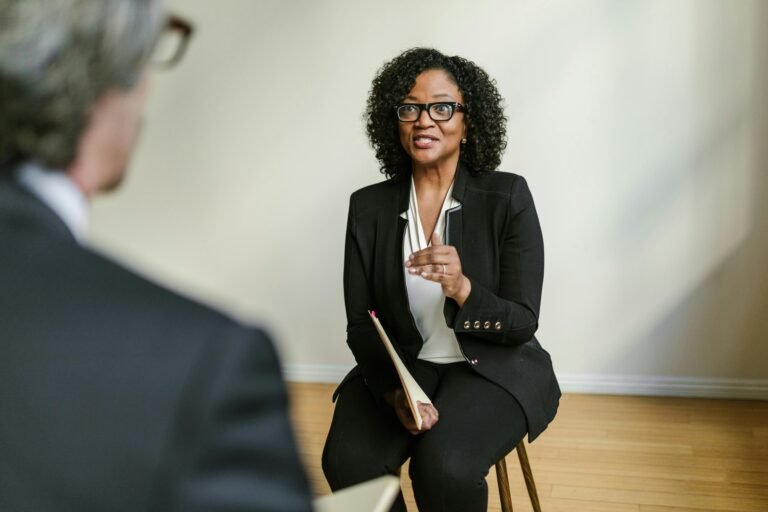Whether you’re a newly certified school counselor or bringing years of experience to the table, interviewing for a School Counselor role requires you to show a blend of empathy, professionalism, and practical strategy. Hiring teams want to know that you’re equipped to support students’ academic, social, emotional, and career development, all while working collaboratively with teachers, families, and administrators.
Below are 10 of the most commonly asked interview questions for school counselors, along with realistic, example-driven responses that reflect the heart of the profession.
10 Commonly Asked Interview Questions for School Counselors with Example-driven Responses
1. “What inspired you to become a school counselor?”
What they’re looking for: Authentic motivation and commitment to student well-being.
Sample Response:
“I’ve always believed in the power of early intervention and supportive guidance. In high school, I had a counselor who helped me through a tough personal time, and it completely shifted the direction of my life. That experience made me want to be the kind of adult who listens, advocates, and helps students feel seen and supported. Now, I’m passionate about creating a safe, inclusive space for students to grow, whether they’re struggling with anxiety, navigating peer pressure, or planning their futures.”
Tip: Personal stories are powerful; briefly share one that connects you to the work.
2. “How do you support students’ emotional and mental health needs?”
What they’re looking for: Your approach to counseling and mental health support.
Sample Response:
“I take a trauma-informed, student-centered approach. I use individual counseling, small group work, and classroom lessons to address emotional and behavioral needs. For example, last year I ran a weekly ‘Calm Minds Club’ during lunch for students with anxiety. We practiced mindfulness, talked through stress triggers, and used journaling as an emotional regulation tool. I also work closely with teachers to recognize signs of distress and coordinate with outside mental health providers when needed.”
Tip: Give examples of programs or interventions you’ve used effectively.
3. “How do you handle confidentiality when a student shares something sensitive?”
What they’re looking for: Professional judgment and ethical boundaries.
Sample Response:
“I always make confidentiality clear from the start, explaining to students that our conversations are private unless someone is being hurt or is in danger. For instance, a student once confided in me about a situation at home involving emotional abuse. I explained I was concerned for their safety and would need to report it, but reassured them they wouldn’t go through it alone. I followed protocol and kept them informed at every step. Maintaining trust while protecting students is a balance I take seriously.”
Tip: Show your understanding of legal and ethical responsibilities without sounding robotic.
4. “How do you approach building relationships with students from diverse backgrounds?”
What they’re looking for: Cultural responsiveness and interpersonal skills.
Sample Response:
“I take time to listen, learn, and honor each student’s identity. At my previous school, I helped coordinate a ‘Cultural Storytelling Week,’ where students shared family traditions, languages, and heritage. It opened up conversations and made students feel proud of who they are. I also make sure the resources and visuals in my office reflect diverse races, family structures, abilities, and gender identities. Building trust starts with making students feel accepted and understood.”
Tip: Show how you actively promote equity and inclusion, not just that you “value diversity.”
5. “What strategies do you use to support students who are struggling academically?”
What they’re looking for: Practical and collaborative approaches to academic support.
Sample Response:
“First, I look at the whole picture—home life, emotional well-being, learning needs—because academic struggles rarely exist in a vacuum. I meet one-on-one with the student to understand their challenges, then loop in teachers and families to create a support plan. For example, I worked with a 9th grader who was failing multiple classes. After learning he had undiagnosed ADHD, I helped connect him with an evaluator and worked with teachers on classroom accommodations. We also built a weekly check-in routine that helped him build confidence and structure.”
Tip: Demonstrate your ability to connect the dots and act as a bridge between students and support systems.
6. “How do you manage crises, such as a student experiencing suicidal thoughts?”
What they’re looking for: Emotional stability, crisis protocol knowledge, and calm decision-making.
Sample Response:
“In any crisis, my first priority is to ensure student safety while staying grounded and calm. I follow district protocols and risk assessment procedures, such as using tools like the Columbia-Suicide Severity Rating Scale if appropriate. I once had a student disclose thoughts of self-harm during a casual conversation. I kept them with me, contacted the school psychologist and administrator, and stayed by their side until a parent and outside mental health support arrived. Afterward, I worked with teachers to create a reintegration plan and provided ongoing check-ins.”
Tip: Be specific. Show that you know your role and are prepared to take action swiftly and sensitively.
7. “How do you support college and career readiness?”
What they’re looking for: Your ability to help students plan for life after high school.
Sample Response:
“I use a combination of classroom guidance lessons, one-on-one planning, and school-wide initiatives. I help students identify their strengths and interests using tools like the YouScience or Naviance platforms, and I organize events like Career Exploration Week and college application workshops. Last year, I created a ‘Senior Checklist’ that guided students through FAFSA, applications, and scholarship deadlines—our submission rate increased by 30% compared to the previous year.”
Tip: Showcase a tangible success and how you made the college/career process accessible to all students.
8. “How do you collaborate with teachers and families?”
What they’re looking for: Teamwork, communication, and problem-solving.
Sample Response:
“I believe strong partnerships make all the difference in student success. I regularly meet with teachers to discuss student concerns and offer strategies for classroom support, like implementing quiet breaks or flexible deadlines. I also stay in close contact with families, especially when we’re working through a behavioral plan or mental health challenge. For example, I had a student experiencing grief, and I coordinated with their family, teacher, and our school social worker to create a flexible academic schedule while providing emotional support.”
Tip: Speak to your ability to lead or facilitate meetings and conversations with sensitivity.
9. “What role do you believe school counselors should play in promoting equity and inclusion?”
What they’re looking for: Your stance on advocacy and social justice.
Sample Response:
“Counselors must be active advocates for equity. That means examining data to identify disparities in academic performance, disciplinary action, or advanced course enrollment—and working to address them. At my last school, I noticed English Learners were underrepresented in our honors program. I collaborated with teachers to adjust the referral process and held info sessions for multilingual families. We saw a 40% increase in EL student enrollment the next year. Equity isn’t about treating every student the same—it’s about removing barriers so every student has access to opportunity.”
Tip: Give a real example of how you identified and addressed inequity.
10. “Why should we hire you as our school counselor?”
What they’re looking for: Confidence, alignment with the school’s needs, and passion for the role.
Sample Response:
“I bring a deep commitment to helping all students feel supported, capable, and seen. I’ve worked in diverse schools and understand the importance of both individual care and system-wide change. Whether I’m helping a student manage test anxiety or working with a team to improve mental health access, I lead with empathy and strategy. I believe your school’s emphasis on whole-child education and inclusive practices aligns perfectly with my values. I’d love to bring my skills and heart to your counseling team.”
Tip: Be concise but enthusiastic—tie your skills directly to the school’s mission.
In Closing
A strong school counselor combines warmth with strategy, and empathy with action. Whether you’re addressing mental health concerns, advocating for equity, or helping students plan for their future, your impact is far-reaching. By reflecting on these sample responses and tailoring them to your own experiences, you’ll be ready to communicate your value confidently in your next school counselor interview.
Good luck on your interview and remember that you’ve got this: your presence matters, and your work as a school counselor makes a difference.
Related Posts
10 Examples of Using the STAR Method for a School Counselor Job Interview
What to Say and What Not to Say About a Previous Employer
How to Conduct a Self-Assessment to Identify Your Strengths and Weaknesses
Why You Should Never Criticize a Former Employer During a Job Interview
5 Strategies for Turning a Negative Job Experience into a Positive Interview Discussion









